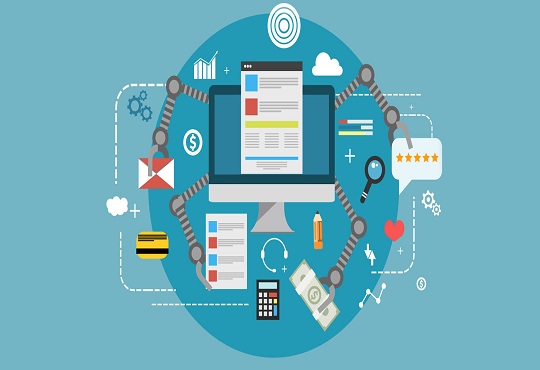What RPA has in store for Healthcare Industry
Abhrasnata Das | Thursday, 28 April 2022, 14:05 IST
 Healthcare expenditures are currently rising year after year, and the predicted growth in the number of patients necessitates the hiring of additional medical personnel. As a result, the quality of medical care suffers. At the same time, the organizations are looking for methods to save costs, improve job efficiency, and, ultimately, deliver better patient care. Here is where Robotic Healthcare Automation (RPA) may assist since it can allow firms to remotely monitor the state of customers, identify scenarios when the patient has strayed from a prescribed treatment plan, and much more.
Healthcare expenditures are currently rising year after year, and the predicted growth in the number of patients necessitates the hiring of additional medical personnel. As a result, the quality of medical care suffers. At the same time, the organizations are looking for methods to save costs, improve job efficiency, and, ultimately, deliver better patient care. Here is where Robotic Healthcare Automation (RPA) may assist since it can allow firms to remotely monitor the state of customers, identify scenarios when the patient has strayed from a prescribed treatment plan, and much more.
Let’s now shed light into different factors and understand how RPA will transform the future of healthcare in the coming days.
Data and Diagnostics
Patients' personal information, diagnoses, and treatment cycles are all collected in vast quantities by healthcare providers. As all of the data is housed in a single database, removing and optimizing it for analysis can be time-consuming and difficult. Furthermore, with fresh individuals and conditions, the volume of data continues to grow every day. As a result, healthcare practitioners may be required to extract and optimize data on a regular basis.
RPA software can record and monitor increasing volumes of data effortlessly. With the help of RPA in healthcare services, hospitals and clinics can optimize and extract their data to generate analytics with the help of other digital systems. Such analytics will offer profound insights into diagnosis methods and different types of treatments. Leveraging such insights, healthcare providers can deliver accurate diagnosis and develop well-tailored treatments. With this approach, healthcare providers can easily track and analyze large volumes of data and spend a majority of their time attending and assisting their patients.
Optimizing healthcare workflows
Managing and coordinating healthcare, remote monitoring, and population wellness are all important processes in a healthcare facility. Routine actions for healthcare practitioners and patients are included in these crucial processes. In most cases, processes are controlled manually, which may be wasteful.
The use of RPA in healthcare can help to consolidate and simplify various operations. Shifting these mundane chores from human agents to bots can help healthcare providers save money. Additionally, automating critical procedures will boost overall efficiency. Healthcare practitioners may devote the bulk of their time to patient care and other vital tasks using this strategy.
Enhanced audit procedures
For risk assessment, the auditing technique entails a number of tasks. Such procedures, as well as their outcomes, must be documented in order to provide reports. These reports are delivered to the appropriate people for review and approval. These audits can be carried out for a variety of reasons, including patient safety and service quality. Regulatory compliance requires the reports issued during healthcare audits. Collecting and assessing several reports from various auditing activities, as well as interacting with multiple stakeholders, may be time-consuming. Errors in these reports can also lead to regulatory non-compliance.
Audit procedures, on the other hand, may be easily optimized with the use of RPA in healthcare services. During audits, RPA bots can capture data and create reports. The reports may be shared automatically with those who need to see them for review and approval. Hospital staff may use RPA software to track the development of these reports and see which individuals have still to approve them. RPA software can assist healthcare organizations guarantee responsibility for various auditing procedures using this method. In the event of non-compliance, an RPA programme may immediately identify the individual who approved the reports.
Speedy Settlements
The application of RPA in healthcare services, on the other hand, may readily optimize audit procedures. RPA bots may take data and provide reports during audits. The reports might be automatically shared with those who need to evaluate and approve them.
RPA software may be used by hospital employees to follow the progress of these reports and determine who has still to approve them. Using RPA software, healthcare organizations can ensure accountability for a variety of auditing procedures. An RPA software can quickly identify the person who approved the reports in the case of non-compliance.
Post treatment care
RPA may also be used to manage post-discharge care, allowing patients to recuperate safely at home after leaving a hospital. RPA may, for example, be used to send reminders to patients about key acts like taking medicine, consuming nutrients, or sticking to a food plan.
Furthermore, RPA may prompt people to take vital measurements, such as blood pressure, and then alert healthcare providers if situations were concerning in any manner. In this approach, the RPA serves as a link between the hospital and the patient's home. This can help patients have a better experience by allowing them to recuperate at home, as well as ease demand on hospital beds for healthcare staff.
The Way to Future
Effective implication of RPA in the healthcare industry will not only induce quality into the overall system, but will also transform the healthcare ecosystem into a transparent entity. Moreover, the advent of intelligent process automation (IPA) will make RPA smarter. With the help of cognitive technologies and machine learning in healthcare, IPA can process unstructured data and make informed decisions.




